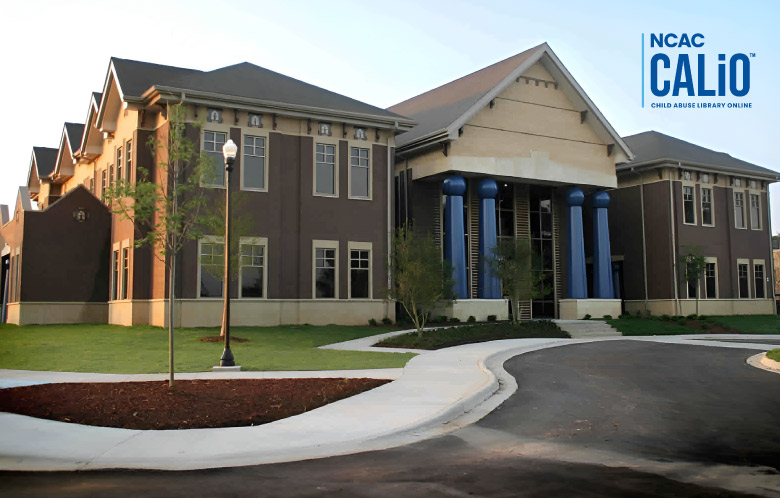
Overview
Founded in 1985, the National Children’s Advocacy Center (NCAC) pioneered the multidisciplinary team model for supporting child victims of abuse. This revolutionary approach brings together law enforcement, child protective services, medical professionals, mental health practitioners, prosecutors and victim advocates under one roof to reduce the trauma children could experience when recounting abuse and streamline the support system for families. Today, nearly 1,000 Children’s Advocacy Centers (CACs) across the U.S. and in countries around the world have adopted this model. NCAC operates as a central training and knowledge hub for CACs, State Chapters for CACs, and international organizations, hosting virtual and in-person workshops on evidence-based best practices, training for forensic interviewing and additional professional development.
To support their wide network of professionals, NCAC launched the Child Abuse Library Online (CALiO™) in 2004 — a digital library offering access to critical research and best practices in child abuse prevention, intervention and prosecution. Today, the site supports thousands of unique visitors each year from over 100 countries around the world.
Resource challenges
As a nonprofit organization, NCAC faces unique challenges when it comes to the maintenance of their e-resources. Their vital mission being federally funded, Digital Information Librarian Muriel Wells, M.Ed., MLIS, feels particularly devoted not only to the multidisciplinary team and the victims they support, but also the public community at large. “We have somewhat of an extra burden to make sure that we're doing everything possible to provide the best, most accurate, timely, easily accessible information,” says Wells. The first full-time professional librarian hired for the CALiO™ project, Wells has supported the site and its visitors for over 16 years. Laura Spurigo, MSLS, joined her as a fellow Digital Information Librarian in 2023.
CALiO™ provides both open-access resources for the public and subscription database content for CAC staff and their multidisciplinary team members, requiring different levels of resource access. The CALiO™ team initially addressed this complex access question through an open-access repository through DSpace and an EBSCO Discovery Service (EDS) profile for subscription content. Looking to streamline the user experience, the CALiO™ team was interested in leveraging not only the more user-friendly interface of EDS, but also its facets and limiters, for a seamless experience – authenticated or not. In response, EBSCO and CALiO™ worked together to integrate their institutional repository into EDS under an open-access profile, providing a better search experience for both members of the public and the NCAC team.
Growing pains
As CALiO™ continued to grow, so did its complexity. What started as a few web pages linking to a handful of journals and best practices has grown into a robust online collection of more than 2,000 journals and 6,800 open-access publications. The original in-house web solution was built on a specialized infrastructure that required coordination between NCAC’s IT team and external website developers for updates and maintenance.
In addition, the integrations that relied on this specialized code often broke when vendors made updates, leading to significant downtime — sometimes lasting days at a time— which was unacceptable for a mission-critical resource used by professionals who often require immediate access to resources. When recalling a week-long outage on their site in the summer of 2022, Wells remembers the exasperation of their newly appointed Project Director, Jimmy Widdifield, Jr., LPC: “He was saying, ‘this cannot be happening… we have got to find a better way.’”
Solution: EBSCO Stacks, Powered by EDS
In early 2024, NCAC transitioned CALiO™ to EBSCO’s Stacks, a robust software-as-a-service website solution specifically designed for libraries and research information centers. The migration was led by a dedicated implementation and training team from EBSCO, including Katie Sica, Maria Rice and Graeme Haggerty — all of whom Wells praised for their knowledge and attentiveness.
The Stacks team – the implementation team – that our EBSCO account representatives connected us with is amazing. They were top rate… if you had to complete one of those surveys, rating one to five, they’d probably all get fives.
The Stacks team – the implementation team – that our EBSCO account representatives connected us with is amazing. They were top rate… if you had to complete one of those surveys, rating one to five, they’d probably all get fives.
The team completed the implementation in less than six months, and Stacks now hosts NCAC’s entire research collection – powered by EDS – as well as best practices and guidelines documentation, fact sheets, bibliographies and more. The library is continuously improving and easily updating their site, with events and carousel sliders in development. They are fully supported through ongoing meetings with their Professional Services team. “The site doesn’t go down anymore… We can make changes to the site more easily,” Wells remarked.
Real world impact
Without Stacks’ software-as-a-service infrastructure, CALiO™ would still rely on a fragile in-house solution where code breakage causes extended periods of downtime. For CALiO™'s users, time is of the essence. Wells shares how forensic interviewers conduct research on the platform in court cases where tides can turn in an instant. “Sometimes they need the information pronto, such as during court proceedings” says Wells. “They have to have those articles, that research to support their testimony.” Research shared from CALiO™ has reversed unjust rulings, blocked detrimental state legislation and impacted countless individual lives. “That’s the kind of difference that having access to the research makes.”
As a nonprofit organization, NCAC values cost-effective, high-impact solutions, making Stacks an attainable and mission-aligned choice. Stacks transformed CALiO™ from a hard-to-maintain website into a unified, dynamic, resilient, and user-friendly research hub. For NCAC, this means more than just better technology—it means better outcomes for children around the world.
Conclusion
NCAC’s story is a prime example of how tailored software-as-a-service solutions can advance the mission of advocacy organizations. The flexibility and configurability of Stacks has set a new standard for content management and access in the nonprofit sector.